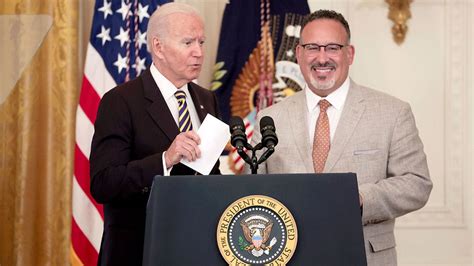By Betsy DeVos
The Biden administration’s proposed re-write of Title IX has generated a record-setting 215,000-plus public comments, many of which forcefully reject what’s being proposed. It’s for good reason.
A well-constructed piece of public policy, whether a law or a regulation, should be clear for all those who have to live under it. Biden’s proposed rule is not. In fact, the only thing about the proposal that is clear is the intention to advance an extreme political agenda over doing what’s right for survivors and all students.
While the failings in this regard are legion, allow me to highlight two that make this rule untenable.
First, the proposal undermines due process—a quintessential hallmark of justice—at every turn. It strains to find any rationale conceivable to justify its extreme positions and is transparent in its attempt to overturn every single due process element of the 2020 regulation I finalized as secretary of education.
Look no further than how it eliminates cross-examination.
The proposed regulation details at great length the significant case law that supports the irreplaceable value cross-examination holds in uncovering the truth. To wit, the rule acknowledges that schools located within the Sixth Circuit’s jurisdiction will have to continue to require cross-examination, as that court deemed it essential in Baum. In fact, at least 38 separate court decisions involving Title IX have affirmed the value of cross-examination in Title IX proceedings.
But instead of following clear legal precedent, the proposed rule cites a few psychological studies that allege cross-examination—though widely regarded as the best fact-finding method ever invented—just can’t work in cases of sexual misconduct. This argument ignores the obvious: every court in America that hears a sexual misconduct case requires cross-examination.
The lack of clarity for students and schools is remarkable. The proposed rule would require cross-examination in some states, but not in others. It discredits the value of information gleaned from cross-examination, but meanwhile acknowledges the courts are likely to uphold a need for cross-examination. Schools would be left between a proverbial rock and a hard place: require cross-examination and invite an investigation from the Office for Civil Rights, or bar cross-examination and face a likely deluge of legal challenges. A well-conceived rule should provide clarity, not a Hobson’s choice.
Compounding the problem, the proposal’s attack on fundamental fairness goes well beyond cross-examination. The proposal would eliminate other procedural protections, allowing schools to conceal evidence used against a student, to lower the burden of proof to the lowest possible bar (known as preponderance of the evidence, or merely “more likely than not”), and to make adjudications in secret instead of a live forum.
It would do all of this damage while also allowing for a single individual to serve as detective, prosecutor, judge, and jury. One need not be a lawyer to see the countless opportunities for bias and maleficence that could introduce to a proceeding that almost irrevocably decides the fate and future of young lives.
Worse still, the proposal banishes an existing requirement that schools apply the same standard for adjudicating sexual misconduct on the part of faculty as that of students. The reason? Some union collective bargaining agreements provide protections for faculty that a school may not want to extend to students. Once again, a political agenda—not what’s right for students—seems to be the underlying motivation for many of these proposed changes to the law.
The proposal also requires a scenario that seems almost unfathomable: if both the accused and supposed victim agree that no offense was committed, it still isn’t enough to stop a school from initiating a full-blown Title IX proceeding, so long as anyone else—even someone who isn’t a student at that school—thinks an offense occurred. How can anyone be expected to be treated fairly in the pursuit of an offense that no one actually involved believes occurred?
Another area where the lack of enforceable clarity becomes obvious is concerning sports, the issue with which Title IX is most synonymous.
The notice for this proposed rule suggests that a yet-unreleased rule will address the interactions between this rule’s definition of sex as “gender identity” and “students’ eligibility to participate on a particular male or female athletics team.
However, this administration has made its position on this topic abundantly clear.
At his confirmation hearing, Secretary Miguel Cardona stated it is the “legal responsibility of schools to provide opportunities for students to participate in activities, and this includes students who are transgender.”
On day one, President Joe Biden issued an executive order stating “Children should be able to learn without worrying about whether they will be denied access to the restroom, the locker room, or school sports.”
In June 2021, the Department issued a notice of interpretation stating that “Title IX of the Education Amendments of 1972 prohibits discrimination on the basis of sex in any education program or activity offered by a recipient of federal financial assistance.”
This very proposal states “A recipient’s education program or activity would also include all of its academic and other classes, extracurricular activities, athletics programs, and other aspects of the recipient’s education program or activity…” (emphasis mine).
Are schools to follow the repeated and clear direction of the Biden administration at every turn? Or instead await a potentially forthcoming rule that might, but more likely will not, acknowledge the very real biological differences between males and females? And how many more female athletes may be harmed in the meantime? The whole thing is an exercise is weaponizing Title IX to undercut the progress Title IX was passed to ensure.
The American people, countless courts, and common sense all affirm the administration’s proposed rule is misguided, damaging to students, and upends the rule of law in this country.
The real question that remains is whether the Biden administration will care.

